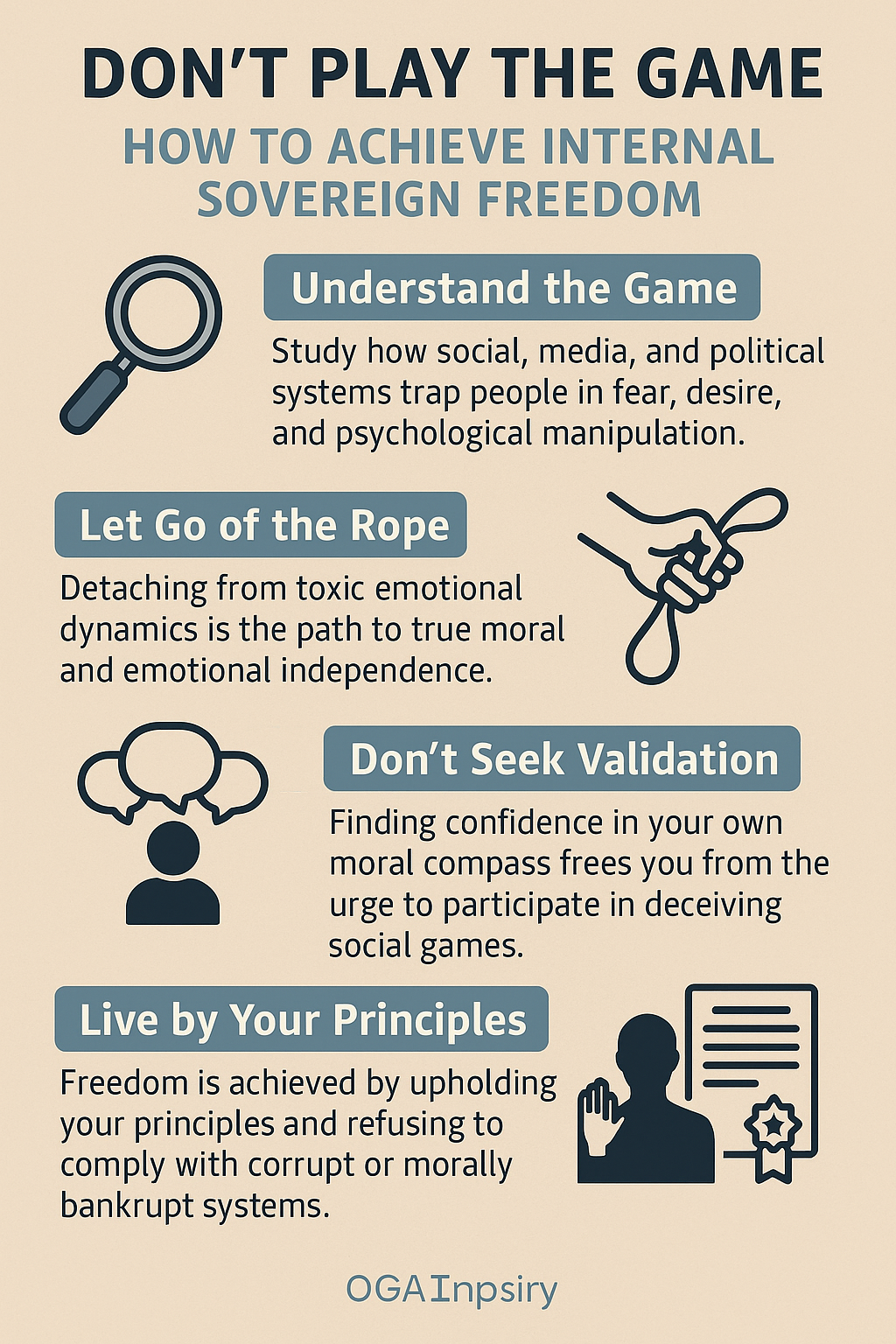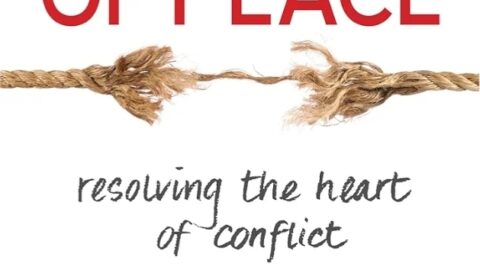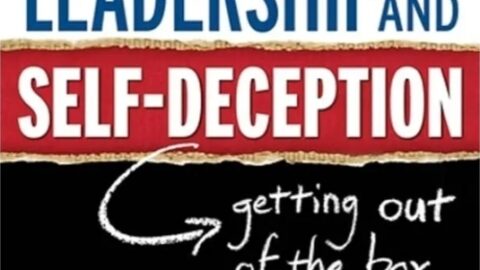In every age, empires rise and fall, leaders come and go, and ideologies battle for dominance. But beneath the noise and chaos lies a deeper game—one most people never realize they’re playing. It’s the game of control through dependency.
Those who master this game do not win by playing better than others. They win by refusing to play at all.
The Hidden Game of Dependency
Every system—whether political, economic, or social—runs on the same hidden engine: keep people needing, craving, and fearing.
- If you can be made to need approval, you’ll seek permission to act.
- If you can be made to fear loss, you’ll trade liberty for “protection.”
- If you can be made to feel incomplete, you’ll keep consuming.
In this game, your attention, obedience, and emotional reactions are the currency. The system doesn’t need you to believe in it—it just needs you to keep participating.
The First Step to Sovereignty: Need Nothing
Internal sovereign freedom begins the moment you reduce your list of must-haves. The less you require from others to feel whole, the less they can manipulate you.
- Advertising loses its grip.
- Political fearmongering stops working.
- Social approval becomes irrelevant.
This is not isolation. It’s independence. You still connect, but not from a place of emptiness—rather, from a place of completeness.
Understanding the Levers of Control
The system relies on four main levers:
- Desire: Convincing you that happiness is “out there” in a product, position, or person.
- Fear: Convincing you that you must surrender freedom to stay safe.
- Shame: Convincing you that you are wrong unless you conform.
- Distraction: Convincing you that constant stimulation is the same as living fully.
When you no longer respond predictably to these levers, you become a problem for those who profit from your compliance.
Carl Jung and the Inner Frontier
Carl Jung taught that wholeness comes from integrating the parts of yourself you’ve disowned—the Persona (mask you wear) and the Shadow (the parts you hide).
- The Persona is what you think others want you to be.
- The Shadow is what you fear others will reject.
Integration means you can be honest with yourself and no longer need the world’s permission to exist as you are. That honesty makes you untouchable by manipulation.
Refusing the Throne
True power often comes from those who don’t chase it. When you refuse to compete in the popularity contest, you remove yourself from the control grid. The political and corporate world knows this—because it thrives on constant engagement and polarization. If you step outside the arena, you don’t just avoid the blows; you stop feeding the machine.
The Cost of Opting Out
There is a price for sovereign freedom:
- You will be misunderstood.
- You will be accused of arrogance or apathy.
- You will lose certain relationships that were built on mutual neediness.
But this cost is an investment. What you gain is clarity, integrity, and peace—assets no one can confiscate.
The Gain: Internal Sovereignty
To “win” without playing the game means:
- You own your attention. No one else directs it.
- You own your emotions. No trigger pulls you into reactivity.
- You own your values. No crowd can buy or bully you into betraying them.
This is what makes you uncontrollable—not rebellion, not chaos, but quiet, anchored certainty.
The Call to Step Out
If you suspect you’ve been playing someone else’s game, step back.
- Ask: Who benefits from my reaction?
- Ask: What would happen if I simply didn’t engage?
- Ask: What needs am I holding that keep me on someone else’s leash?
The answer will not only set you free—it will make you immune to the manipulations that keep most people trapped.
Internal sovereign freedom is not a destination. It is a posture, a daily choice to refuse the hooks of need, fear, and shame. The world doesn’t need more skilled players of the game—it needs more people willing to walk off the field entirely.
Point-by-Point Breakdown
1. The Scene: The Self-Sufficient Man
- Visual: A man alone on a park bench, not on a phone, not seeking attention.
- Contrast: Others are rushing, posting, swiping—performing for validation.
- He radiates peace and self-completeness.
- Message: His lack of need makes him the most dangerous person in the space.
2. Why He’s Dangerous
- Not dangerous due to power-seeking, but due to being free of need.
- Others are bound by invisible chains—approval, distraction, comfort.
- He’s free because he’s found inner completeness.
3. Society Profits from Emptiness
- Modern systems require people to keep wanting.
- If you stop craving, you stop consuming.
- Ads and media constantly imply: You’re not enough.
- This isn’t just marketing—it’s mind control.
4. Carl Jung’s Insight
- People will do anything to avoid facing their soul.
- When you look inward, you see your identity is built on borrowed beliefs.
- Society fears this because it exposes manipulation.
5. Machiavelli’s Principle
- Rulers should keep people needy and looking to authority for salvation.
- A content, fearless citizen cannot be ruled.
- If you need nothing, you can’t be baited, seduced, or scared.
6. Individuation: Becoming Whole
- Jung’s process:
- Confront the Persona – the mask you wear for social approval.
- Face the Shadow – the disowned parts of yourself.
- Integrate both into wholeness.
- Result: No longer reactive, no longer approval-seeking.
7. Why Systems Fear Wholeness
- All systems (political, corporate, cultural) rely on manipulating desires and fears.
- A person who needs nothing is immune to this control.
- This isn’t rebellion—it’s opting out.
8. Psychological Independence
- Not fear of being alone.
- Not seeking consensus—comfortable standing alone.
- Immune to bribery because needs are minimal.
9. Inner Transformation Path
- Confront Persona → Face Shadow → Integrate Inner Opposite (anima/animus) → Meet the Self.
- Wholeness leads to freedom from judgment, shame, and manipulation.
10. Power Paradox
- Those uninterested in power often become the most respected.
- Refusing the throne can generate more influence than taking it.
11. Needlessness as Resistance
- Quiet defiance—not loud protest.
- The system thrives by keeping people just dissatisfied enough to consume.
- In politics, dependency is framed as “protection.”
12. The “Glitch in the System”
- A man who doesn’t seek validation is unprofitable and politically unreliable.
- His calm presence exposes the illusion of need.
13. Four Dimensions of Mastery
- Psychological – Wholeness and peace with self.
- Moral – Living by a chosen, tested code.
- Intellectual – Willing to question and reconstruct beliefs.
- Will – Deliberate action despite cost.
14. The Cost of Freedom
- Misunderstood, labeled cold or arrogant.
- Relationships based on mutual need dissolve.
- Loss of the old self who craved approval.
15. The Gain
- True sovereignty: thoughts, emotions, beliefs, and presence are self-owned.
- Freedom from reactivity.
- Actions come from truth, not from chasing acceptance.
16. The Call to Action
- Question who benefits from your desire for approval.
- Confront shadow and persona.
- Achieve needlessness—not superiority—so you are uncontrollable.
- The world doesn’t need more obedient men, but more whole, anchored men.







